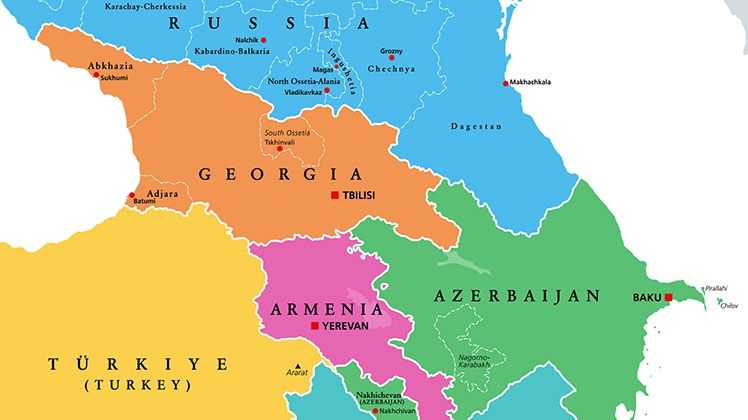What on earth does the South Pacific have to do with Azerbaijan?
- 16.05.2024
- 0
- Télécharger la publication (PDF - 277,13 KB)

Read the article
Diplomatic relations between France and Azerbaijan have deteriorated over the last few months. However, it is to no Western state’s strategic benefit to have a prolonged disagreement with Baku, as is demonstrated by the cautious diplomacy in play over Armenia: with Azerbaijan both the key to the Caucasus and a critical link in Europe’s energy security chain, this is a region where geopolitical realism rules.
Baku is “meddling” and this meddling is “extremely harmful”. So said Gérald Darmanin after a New Caledonian separatist elected official signed a memorandum of collaboration with the Azerbaijani Parliament. Then there is the involvement of Tavini Huira’atira (formerly the Polynesian Liberation Front) in the Baku Initiative Group, created to “stand against colonialism”, which also counts among its members separatists from French Guiana, Martinique and Guadeloupe. As for Corsica, the Azerbaijani Parliament has quite simply called for its independence. In short, all this merely highlights the deterioration in relations between France and Azerbaijan, with Baku accusing Paris of having taken Armenia’s side after Azerbaijan invaded Nagorno-Karabakh and selling ground-to-air defence equipment to Armenia last October (it also accused India of supporting Armenia) – just as Baku was carrying out joint military exercises with Turkey near the Armenian border. Since then, a Frenchman has been detained, diplomats have been expelled and France’s ambassador to Baku has been recalled. Azerbaijan’s diplomatic relations with the United States have also deteriorated to the point where the US Congress was recently rumoured to be planning sanctions (non have materialised to date). This threat no doubt played a part in the subsequent release of a political prisoner and the resumption of telephone consultations between Washington and Baku.
Security, stability, connectivity?
Regardless of the diplomatic choices of a country ranked in the bottom third globally for civil liberties (by both Reporters Without Borders and Transparency International), it is to no Western state’s strategic benefit to have a prolonged disagreement with Baku, as is demonstrated by the cautious diplomacy in play over Armenia: with Azerbaijan both the key to the Caucasus and a critical link in Europe’s energy security chain, this is a region where geopolitical realism rules.
The government in Baku has long seen its strategic geographical location – at the crossroads between Turkey, Iran and Russia – as an asset, dreaming of Azerbaijan as a regional centre for trade with hopes of one day graduating from having the economic profile of an emirate to that of a hub. Even the World Bank is convinced, forecasting that trade will treble between now and 2030, provided existing obstacles – in particular corruption, administrative inertia and traffic congestion – are removed. It must be said, however, that Azerbaijan has never yet managed to turn this ambition into reality. But there are two game-changers that could act as geoeconomic catalysts. One is the war in Ukraine, which has highlighted the importance of circumventing Russia. The other is the conquest of Nagorno-Karabakh and, above all, peace talks with Armenia, which could dispel the threat of conflict.
Country risk: two key questions
It remains to be seen whether Baku will succeed in creating an oasis of stability in a geopolitically tumultuous region (with Georgia in particular meriting close monitoring) and whether the strength of its geographical position will be enough to offset the institutional inertia that has hampered the country’s development thus far. These are the two questions that will frame country risk assessments. Meanwhile, Azerbaijan’s sovereign profile is secured by its external surpluses, its public debt, equivalent to less than 30% of GDP, and its record buffer of $56 billion from SOFAZ, the State Oil Fund of the Republic of Azerbaijan. This cash cushion will also enable the country to fund investment in Karabakh. In fact, with net currency assets estimated at 67% of GDP, Azerbaijan is the leader in its sovereign peer group: as far as its sovereign debt profile is concerned, you have to look really hard to find anything to worry about. The focus of risk analysis is not quantitative, then; rather, it is on the informal areas of diplomatic relations, reputational risk and the government’s ability to not only mark out a development trajectory but deliver on it.
Despite its oil and gas wealth, Azerbaijan’s growth potential (around 2% a year) remains constrained by high levels of corruption, centralised administrative and political control and rising military expenditure – propelling the country from 16th to 9th place in a global ranking of economic militarisation1 between 2017 and 2022. With the economy vulnerable to volatility in its energy income, the need to diversify remains, though it has become more resilient to shocks (volatility is one of the weaknesses in its sovereign rating).
The war in Ukraine has strengthened Azerbaijan’s position as a pivotal country
Baku now has more geopolitical room for manoeuvre, enabling it to pursue a Turkish-style policy of multi-alignment: its 2022 gas agreement with the European Union (a “reliable” partner according to Ursula von der Leyen) has not destroyed its relationship with Russia (with numerous meetings between Gazprom and SOCAR since a Russian gas delivery agreement was struck). But this multifocal diplomacy means Western investors are forced to navigate grey areas that their own governments will not help them manage: reputational risk over the treatment of not only Armenians but also journalists and political prisoners; the risk of sanctions over the country’s relations with Russia; and the risk of geopolitical instability if new borders with Armenia are not agreed. For regional stability to be a credible proposition, regional peace must first become credible. We’re talking about thirty years of conflict… but we’re also talking about the first peace process to be set in motion in a world on fire. That’s no small thing! The fact remains that none of this is properly priced in by rating agencies, which struggle to accurately reflect such geoeconomic complexity.
What makes the situation even more complicated is that everyone is seeking to woo Azerbaijan. This year’s COP29 will act as an institutional shop window for a country that has shown little commitment to transition (with oil and gas accounting for 90% of exports, 48% of GDP and 53% of government revenue). And then there’s the sixth World Forum on Intercultural Dialogue, held in Baku at the beginning of May. Azerbaijan is also a member of the Shanghai Cooperation Organisation and is developing its diplomatic relations with China. Above all, though, Baku is pursuing pan-Turkic diplomacy in Central Asia, as a member of the Organization of Turkic States, and cultivating relations with Ankara, its oldest ally (the first country to recognise its independence) – so much so that its President, Ilham Aliyev, describes the Azerbaijan and Turkey as being “one nation, two states”. Numerous infrastructure projects are in the offing (including a new pipeline to reduce Nakhchivan’s reliance on Iran). The two countries have a shared goal of regional connectivity as a driver not only of growth but also of cultural unity and solidarity in a Turkic world that is increasingly making itself noticed by assert its geoeconomic existence. This emergence of the Turkic world as a geopolitical reality is one of the consequences of global geopolitical fragmentation.
Keeping an eye on the Zangezur corridor…
Between Nakhchivan and the rest of Azerbaijan lies not only Armenia but also the planned Zangezur corridor, which would give Turkey access to Central Asia via the Caspian Sea without having to pass through Georgia or Iran, both of which heavily tax Turkish trucks. The corridor’s strategic importance, previously masked by the conflict with Armenia, is now becoming clear. It is also of interest to Russia, which is keen to strengthen relations with Ankara and gain access to Armenia. Above all, Zangezur is one of the segments of the Middle Corridor that links China to Europe while circumventing Russia, and could play a hugely important role in trade and energy security in the region (i.e. Europe). It is, however, a worry for Iran because it lessens the latter’s economic importance, with some Iranian journalists even dubbing it a “NATO corridor”. It’s also a worry for Georgia, which it bypasses. And it’s a risk to Armenian sovereignty, especially since Baku is reportedly not against the idea of Russian troops guaranteeing its security. All this makes Zangezur a political wildcard that could drive faster regional integration but could also shift the balance of power in an already fragile region.
…as well as the long north-south route
It is therefore vital that Europe monitor these major shifts in regional infrastructure in its energy storehouse, both from east to west and from north to south. With the sort of irony that usually accompanies sanctions, the anti-Russia bloc is speeding up links along three routes that form part of another corridor, between Saint Petersburg and Mumbai, one of which runs through Azerbaijan (the highway to Russia is open). Moreover, India’s foreign minister has indicated that the Houthi blockade of the Red Sea makes this north-south route even more attractive to Delhi. The Middle East conflict is also finding its way into the Caucasus both via Iran and through relations between Baku and its drone supplier, Israel, which it in return supplies with energy. It should also be noted that Turkey has, out of geopolitical realism, reportedly not blocked shipments that pass through its ports on their way from Azerbaijan to Israel.

It remains to be seen whether Baku will succeed in creating an oasis of stability in a geopolitically tumultuous region (with Georgia in particular meriting close monitoring) and whether the strength of its geographical position will be enough to offset the institutional inertia that has hampered the country’s development thus far.
Tania SOLLOGOUB, Economiste
